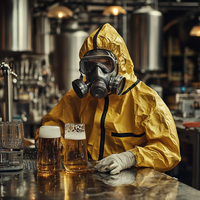The Ongoing Battle Against Bacteria In Beer Making
Posted by Matteo Lahm on 5th Mar 2025
If you feel like you're fighting a losing battle to avoid bacterial contamination in your beer making process, you're not alone. Bacteria can thwart your beer at any stage of brewing, from the raw materials to the finished product. Even after your beer is bottled or kegged, it can become contaminated if not stored properly. How do you fight this foe and ensure it is never an uninvited guest in your glass?
There are many different types of bacteria lurking in every crevice that can contaminate your beer, and each can cause different flavors or aromas. Some bacteria, such as Lactobacillus and Pediococcus, produce lactic acid which can give beer a sour taste. Other bacteria, such as Brettanomyces, can produce off-flavors and aromas.
Easy Clean and Star San are the best cleaner and sanitizer you can use. There are a few reasons why Easy Cleanworks so well for beer making. First, it contains compounds that help break down proteins, which can make your beer cloudy. Second, it helps prevent the growth of bacteria that can cause spoilage. Finally, it helps to remove unwanted flavors from your beer. Star San is a good sanitizer because it is an effective disinfectant and sanitizer that is safe for you to use on food contact surfaces. It is also a non-corrosive sanitizer that will not damage your equipment or surfaces. Yes, it is just as important to sanitize your workspace as it is your equipment.
After you have finished sanitizing, let all your equipment dry thoroughly before starting your brew. This is especially true with hoses. A suggested practice is to use your hoses only once. If this is not possible for you, a hose brush works really well to clean your hoses prior to sanitizing. Also, any tools or utensils that are not stainless steel should not be used for anything but your beer. Store your tools in a plastic tote that you also clean and sanitize before putting your equipment away. Paying attention to small details goes a long way with beer making.
Bacterial contamination is a serious problem in brewing, and it can be difficult for you to avoid. However, with good sanitation practices, you can produce clean, flavorful beer again and again.

Easy Clean and Star San are the best cleaner and sanitizer you can use. There are a few reasons why Easy Cleanworks so well for beer making. First, it contains compounds that help break down proteins, which can make your beer cloudy. Second, it helps prevent the growth of bacteria that can cause spoilage. Finally, it helps to remove unwanted flavors from your beer. Star San is a good sanitizer because it is an effective disinfectant and sanitizer that is safe for you to use on food contact surfaces. It is also a non-corrosive sanitizer that will not damage your equipment or surfaces. Yes, it is just as important to sanitize your workspace as it is your equipment.
After you have finished sanitizing, let all your equipment dry thoroughly before starting your brew. This is especially true with hoses. A suggested practice is to use your hoses only once. If this is not possible for you, a hose brush works really well to clean your hoses prior to sanitizing. Also, any tools or utensils that are not stainless steel should not be used for anything but your beer. Store your tools in a plastic tote that you also clean and sanitize before putting your equipment away. Paying attention to small details goes a long way with beer making.
Bacterial contamination is a serious problem in brewing, and it can be difficult for you to avoid. However, with good sanitation practices, you can produce clean, flavorful beer again and again.

